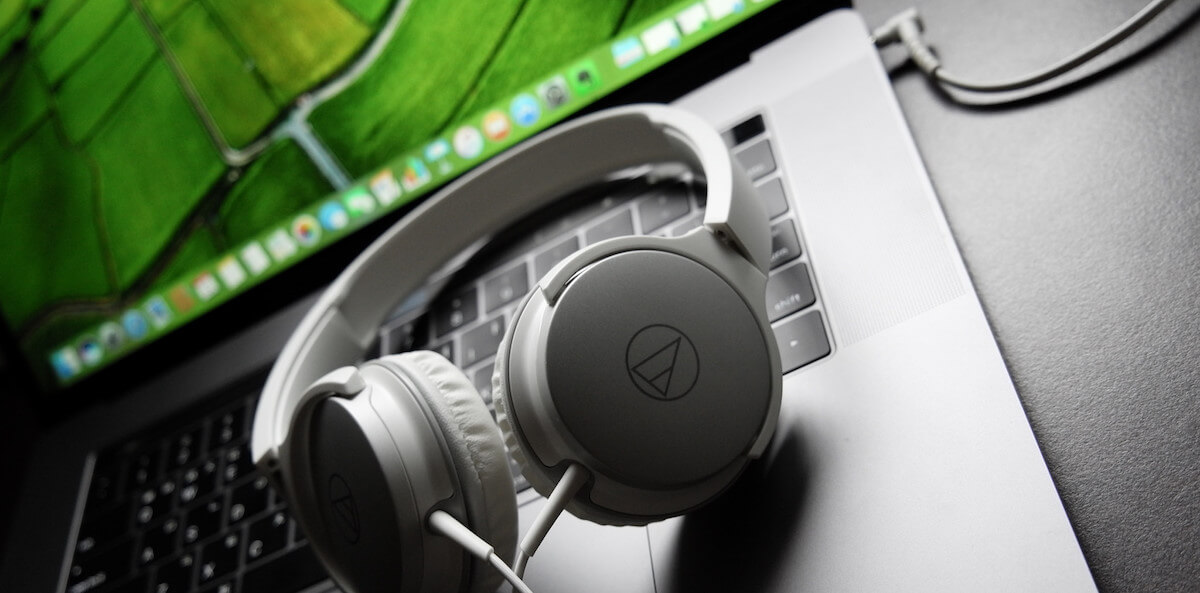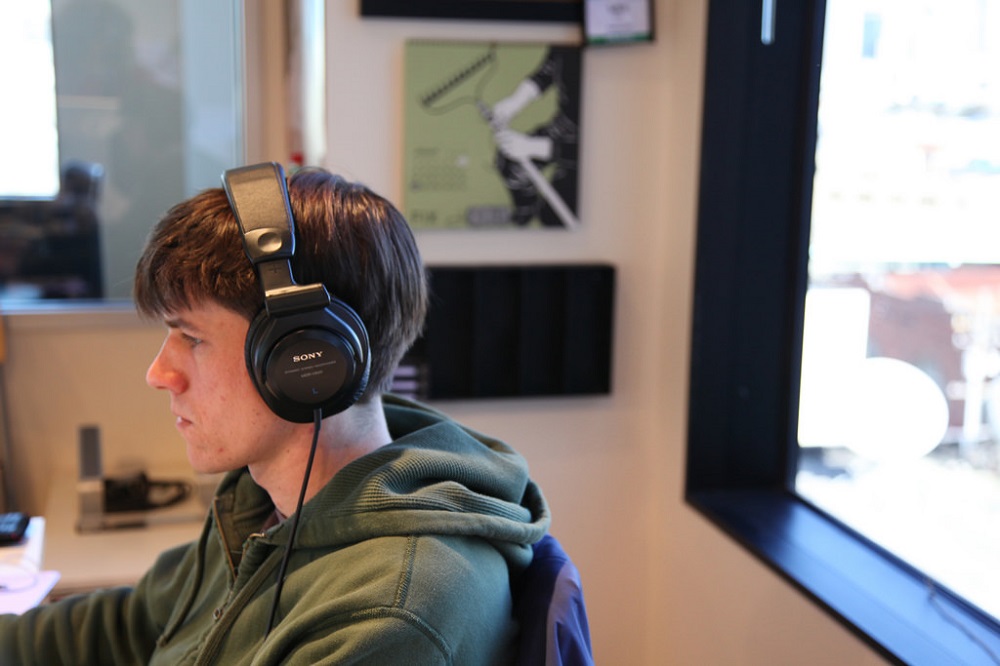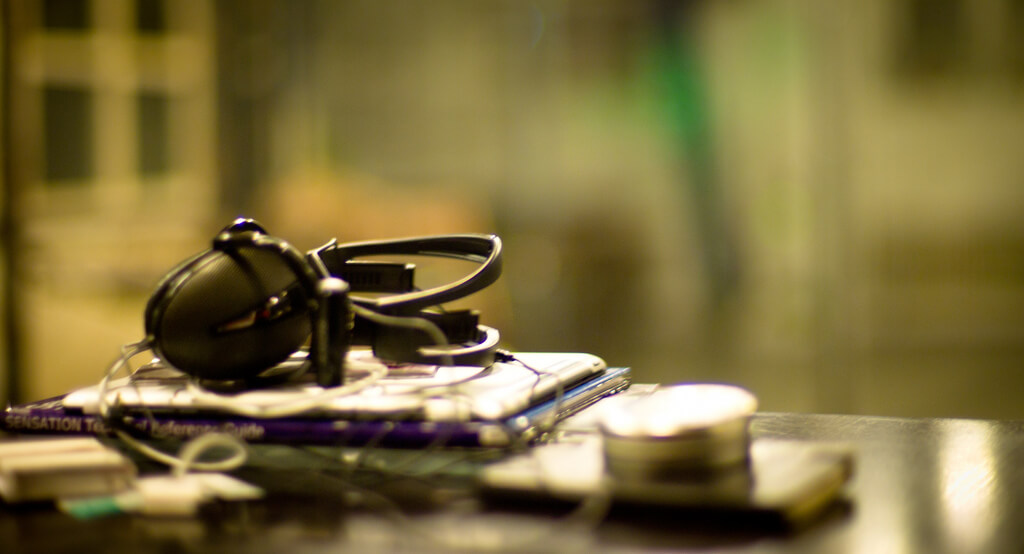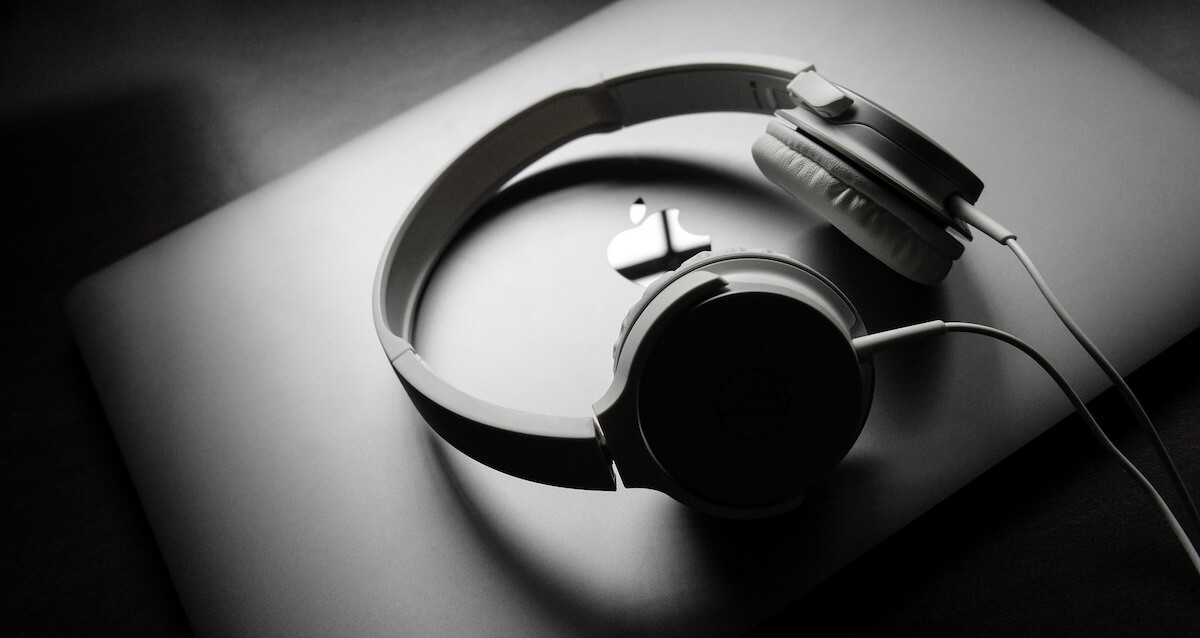Headphones at work: what research says
We all understand how headphones work. However, their effect on the workflow is strikingly different depending on the conditions and “context” of use.

Photo by Aaron Yoo CC
From the very beginning of their existence, open offices have been criticized by both workers and researchers. Back in 1999, employees of Cornell University (Cornell University) Gary Evans (Gary Evans) and Dana Johnson (Dana Johnson) conducted an experiment in which they investigated the effect of noise on the productivity of office workers. Forty clerks were divided into two groups, one of which worked in a noisy office, and the other - calm.
According to the results of the experiment, the productivity of both groups was approximately the same, however, the level of stress hormones in the “noisy” group significantly exceeded the level in the “quiet” one. Also, participants from the "noisy" group showed less motivation in solving complex puzzles. The researchers concluded that although this accumulation of stress does not affect short-term performance, it can affect the overall productivity of employees in the future.

Photo by Loic Le Meur CC
Later studies confirmed the hypothesis of Evans and Johnson about the dangers of open offices. In 2013, Jungsoo Kim and Richard de Dear interviewedoffice staff for satisfaction with their work conditions. Nearly half of those surveyed said that the lack of sound insulation was the cause of many distractions, leading to lower productivity. Researchers also interviewed closed-type office workers. It turned out that less than 10% have difficulties in interacting with their colleagues, although this problem is one of the main arguments of adherents of open offices.
However, open offices are still the preferred option for many companies. According toAbout 70% of offices in the United States have low partitions, or none at all, of the International Facility Management Association. The reason for the popularity of such a decision is the desire to save money and to establish close interaction of employees. Large IT companies, such as Facebook, Google and eBay, further popularize the solution - in 2015, Facebook built a new headquarters for 2,800 engineers, fully designed in an open office format.
In such circumstances, employees have to find their own ways to reduce stress and increase concentration. Headphones are one such solution. Not surprisingly, the market for portable audio devices is constantly growing - in the US by 10% per year, whileworldwide - by 6%. Noise-canceling technologies and wireless usage make them more and more office-friendly, which means that with the ongoing trend for open offices, the demand for headsets among employees will only grow.
In 2017, a group of Dutch scientists conducted a study on the effect of music on productivity. The study involved 155 people who were divided into five different groups. Four groups listened to various classical music while working, and the fifth group worked in silence. As a result, scientists came to the conclusion that groups that listened to music developed divergent thinking . It is considered creative, and it consists in searching for a set of solutions to the same task. In a group that worked in silence, convergent thinking developed. With this approach, the person uses the previously learned algorithms.

Photo by nik gaffney CC
Music has helped to increase productivity in the case when for the task there is no clear algorithm formed in advance. If there is a specific algorithm for solving a problem, then it is better, according to the study, to work in silence.
Such conclusions clearly differ from the results of the study from 1972. Even then, the positive effect of background music was discovered when repetitive tasks were performed by plant workers. This means that the question of the influence of music is still open and depends on the specific working conditions.
However, the headphones themselves in the issue of productivity play a special role. Their very use can greatly simplify the work of representatives of certain professions. For example, the credit organization Love Finance in itsblog wrote about a sharp increase in sales productivity after the commissioning of wireless headsets. When communicating remotely with a client, it is very important to clearly speak and hear. The built-in microphones filtered up to 75% of office noise, and the headphones made it possible to communicate with the client without being distracted by the conversations of colleagues.
Despite all the advantages, the constant use of headphones is not recommended. One of the side effects is hearing impairment. Dr. James Foy of the American Osteopathic Association explains to his patients: “If you don’t hear anything around, then the volume in your sound device is too high. The recommended time to use personal audio devices is no more than an hour per day. The higher the volume, the shorter the listening time should be. At 60% of the maximum volume, you can listen to music for no more than 5 minutes a day. ”
In addition to harm to health, listening to music with headphones can have a negative impact on productivity. StudyFu Jen, University of Taiwan, showed that the music had a negative effect on the participants' attention. Such an influence was also in the case that it was their favorite music, and in the event that it was music that they did not like. Also, testing of 102 students showed that listening to music with words in it led to worse results on concentration tests.

Photo by Aaron Yoo CC
It should be noted that if the music was without words and any emotional significance for the listener, its negative impact on productivity was less.
The negative effect of the constant use of headphones in the office is also isolation. StudyA University of California revealed a link between employee isolation and organization benefits. According to the study, employees isolated from the team (including through headphones) feel alienated and show low involvement in the organization.
In 2010, the recruitment agency, Robert Half Technology, conducted a survey among 1,400 IT directors. According to the survey, the use of headphones and plugs was one of the most significant violations of office etiquette. However, time passes, and the new generation of Millennial employees is 75.1% more likely to listen to music than the generation of the 80s, companies have to adjust to the changing habits of employees.
There are companies that introduce modern approaches. When Autodesk moved into a new open office, it was specifically installedpink noise system. She made a soft sound like ventilation noise. After three months, Autodesk decided to turn off the system in order to assess its impact. The management was surprised by the number of complaints - people could not understand for what reason the office suddenly became so noisy. The speech of colleagues could be heard at a distance of up to 20 meters, and with the system turned off to just 5.
Such initiatives reduce the need for headphones, reducing the harmful effects of noise in open offices. However, this does not mean that the headphones lose their relevance. In the article, New York Times explored another possible use - just wear them without music. One of the managers mentions that wearing headphones serve as a kind of “do not distract” sign. Programmer Forrest Smith on his blogIt also describes the advantages of using this type of headset in the office, noting separately that headphone plugs have much better passive noise reduction compared to overhead headphones.
Another method of reducing stress and increasing productivity is listening to music before work. According to neuroscientist Daniel Levitin (Daniel Levitin), listening to your favorite music for 10-15 minutes before the start of work will be the most productive. This process helps to relax, elevate mood and promotes better concentration. This advice is especially relevant for people who get to the house by public transport. In this case, noise-canceling headphones can reduce the harmful effects of noise, and your favorite music will prepare you for a productive start to the working day.
Additional reading from our “Hi-Fi World”:

Photo by Aaron Yoo CC
Headphones as a cure for open offices
From the very beginning of their existence, open offices have been criticized by both workers and researchers. Back in 1999, employees of Cornell University (Cornell University) Gary Evans (Gary Evans) and Dana Johnson (Dana Johnson) conducted an experiment in which they investigated the effect of noise on the productivity of office workers. Forty clerks were divided into two groups, one of which worked in a noisy office, and the other - calm.
According to the results of the experiment, the productivity of both groups was approximately the same, however, the level of stress hormones in the “noisy” group significantly exceeded the level in the “quiet” one. Also, participants from the "noisy" group showed less motivation in solving complex puzzles. The researchers concluded that although this accumulation of stress does not affect short-term performance, it can affect the overall productivity of employees in the future.

Photo by Loic Le Meur CC
Later studies confirmed the hypothesis of Evans and Johnson about the dangers of open offices. In 2013, Jungsoo Kim and Richard de Dear interviewedoffice staff for satisfaction with their work conditions. Nearly half of those surveyed said that the lack of sound insulation was the cause of many distractions, leading to lower productivity. Researchers also interviewed closed-type office workers. It turned out that less than 10% have difficulties in interacting with their colleagues, although this problem is one of the main arguments of adherents of open offices.
However, open offices are still the preferred option for many companies. According toAbout 70% of offices in the United States have low partitions, or none at all, of the International Facility Management Association. The reason for the popularity of such a decision is the desire to save money and to establish close interaction of employees. Large IT companies, such as Facebook, Google and eBay, further popularize the solution - in 2015, Facebook built a new headquarters for 2,800 engineers, fully designed in an open office format.
In such circumstances, employees have to find their own ways to reduce stress and increase concentration. Headphones are one such solution. Not surprisingly, the market for portable audio devices is constantly growing - in the US by 10% per year, whileworldwide - by 6%. Noise-canceling technologies and wireless usage make them more and more office-friendly, which means that with the ongoing trend for open offices, the demand for headsets among employees will only grow.
Headphone and productivity
In 2017, a group of Dutch scientists conducted a study on the effect of music on productivity. The study involved 155 people who were divided into five different groups. Four groups listened to various classical music while working, and the fifth group worked in silence. As a result, scientists came to the conclusion that groups that listened to music developed divergent thinking . It is considered creative, and it consists in searching for a set of solutions to the same task. In a group that worked in silence, convergent thinking developed. With this approach, the person uses the previously learned algorithms.

Photo by nik gaffney CC
Music has helped to increase productivity in the case when for the task there is no clear algorithm formed in advance. If there is a specific algorithm for solving a problem, then it is better, according to the study, to work in silence.
Such conclusions clearly differ from the results of the study from 1972. Even then, the positive effect of background music was discovered when repetitive tasks were performed by plant workers. This means that the question of the influence of music is still open and depends on the specific working conditions.
However, the headphones themselves in the issue of productivity play a special role. Their very use can greatly simplify the work of representatives of certain professions. For example, the credit organization Love Finance in itsblog wrote about a sharp increase in sales productivity after the commissioning of wireless headsets. When communicating remotely with a client, it is very important to clearly speak and hear. The built-in microphones filtered up to 75% of office noise, and the headphones made it possible to communicate with the client without being distracted by the conversations of colleagues.
Not so simple - headphone criticism
Despite all the advantages, the constant use of headphones is not recommended. One of the side effects is hearing impairment. Dr. James Foy of the American Osteopathic Association explains to his patients: “If you don’t hear anything around, then the volume in your sound device is too high. The recommended time to use personal audio devices is no more than an hour per day. The higher the volume, the shorter the listening time should be. At 60% of the maximum volume, you can listen to music for no more than 5 minutes a day. ”
In addition to harm to health, listening to music with headphones can have a negative impact on productivity. StudyFu Jen, University of Taiwan, showed that the music had a negative effect on the participants' attention. Such an influence was also in the case that it was their favorite music, and in the event that it was music that they did not like. Also, testing of 102 students showed that listening to music with words in it led to worse results on concentration tests.

Photo by Aaron Yoo CC
It should be noted that if the music was without words and any emotional significance for the listener, its negative impact on productivity was less.
The negative effect of the constant use of headphones in the office is also isolation. StudyA University of California revealed a link between employee isolation and organization benefits. According to the study, employees isolated from the team (including through headphones) feel alienated and show low involvement in the organization.
Working in headphones - is there a happy medium?
In 2010, the recruitment agency, Robert Half Technology, conducted a survey among 1,400 IT directors. According to the survey, the use of headphones and plugs was one of the most significant violations of office etiquette. However, time passes, and the new generation of Millennial employees is 75.1% more likely to listen to music than the generation of the 80s, companies have to adjust to the changing habits of employees.
There are companies that introduce modern approaches. When Autodesk moved into a new open office, it was specifically installedpink noise system. She made a soft sound like ventilation noise. After three months, Autodesk decided to turn off the system in order to assess its impact. The management was surprised by the number of complaints - people could not understand for what reason the office suddenly became so noisy. The speech of colleagues could be heard at a distance of up to 20 meters, and with the system turned off to just 5.
Such initiatives reduce the need for headphones, reducing the harmful effects of noise in open offices. However, this does not mean that the headphones lose their relevance. In the article, New York Times explored another possible use - just wear them without music. One of the managers mentions that wearing headphones serve as a kind of “do not distract” sign. Programmer Forrest Smith on his blogIt also describes the advantages of using this type of headset in the office, noting separately that headphone plugs have much better passive noise reduction compared to overhead headphones.
Another method of reducing stress and increasing productivity is listening to music before work. According to neuroscientist Daniel Levitin (Daniel Levitin), listening to your favorite music for 10-15 minutes before the start of work will be the most productive. This process helps to relax, elevate mood and promotes better concentration. This advice is especially relevant for people who get to the house by public transport. In this case, noise-canceling headphones can reduce the harmful effects of noise, and your favorite music will prepare you for a productive start to the working day.
Additional reading from our “Hi-Fi World”:
- Put on headphones and become more efficient: How music affects productivity
- 5 reasons why different people evaluate the sound of headphones differently
- "Despite the age": how to protect hearing
- What is it: the Russian market of streaming services
- “Just take and listen to music”: 5 ways and formats to choose from
- The power of sound: what tasks it solves in games
- “Hear past the ears”: unusual ways of perceiving sound
Only registered users can participate in the survey. Sign in , please.
